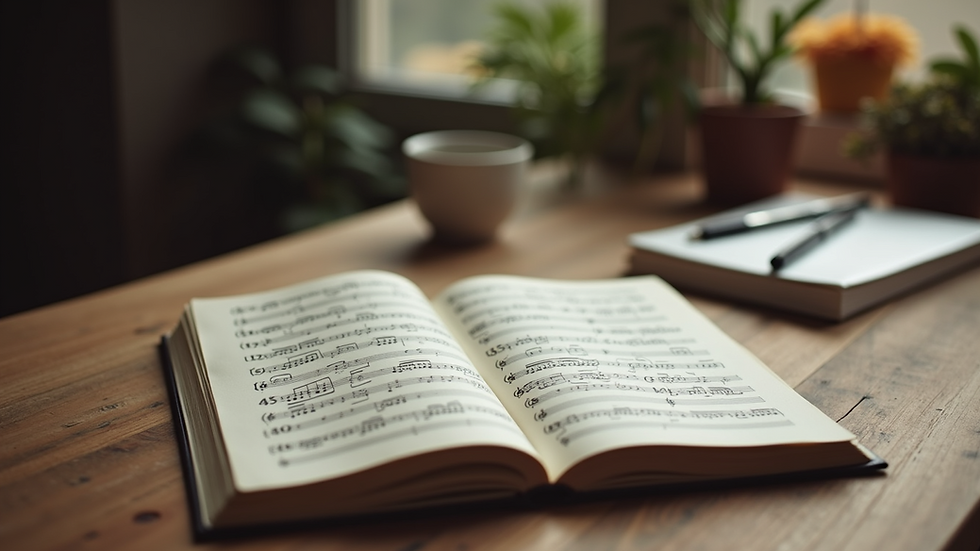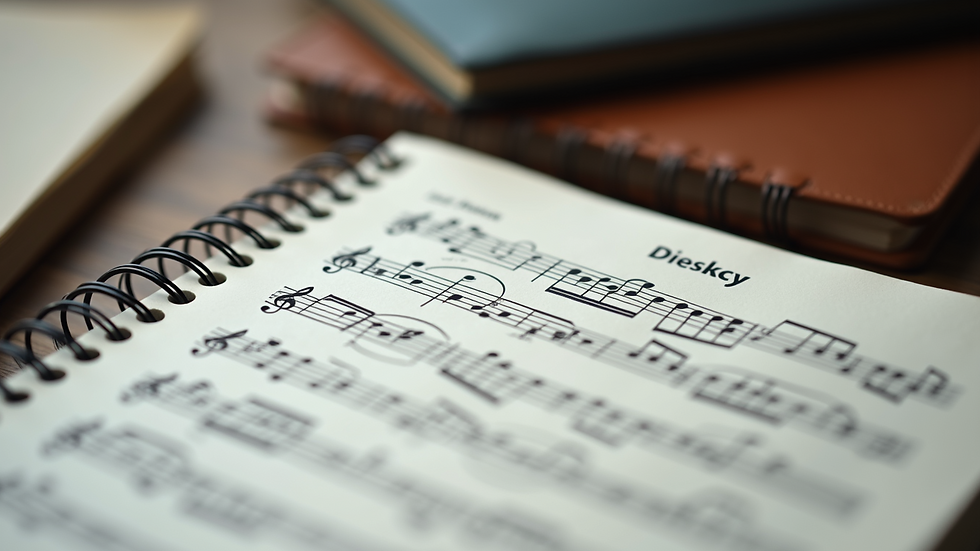Choosing a Notebook Tailored for Musicians
- Neil Milliner

- Jul 29, 2025
- 3 min read
When it comes to capturing musical ideas, lyrics, or practice notes, having the right notebook can make all the difference. Musicians often need more than just blank pages; they require a tool that supports creativity, organization, and inspiration. Choosing a music-themed notebook tailored for musicians is a smart way to enhance your workflow and keep your musical journey well-documented.
Why Music-Themed Notebooks Are a Great Choice
Music-themed notebooks are designed with the unique needs of musicians in mind. Unlike generic notebooks, these often include features such as staff lines for notation, lyric sections, and inspirational quotes from famous artists. This specialized design helps musicians stay organized and motivated.
Some benefits of music-themed notebooks include:
Pre-formatted pages for writing music notes and chords.
Dedicated spaces for lyrics, song ideas, and practice logs.
Creative prompts that encourage songwriting and composition.
Durable covers that often feature music-related artwork or themes.
Using a notebook that resonates with your passion for music can also boost your enthusiasm for writing and practicing regularly.

Features to Look for in Music-Themed Notebooks
When selecting a music-themed notebook, consider the following features to ensure it meets your needs:
Page Layout
Look for notebooks that offer a combination of blank, lined, and staff paper. This flexibility allows you to jot down lyrics, sketch melodies, and write musical notation all in one place.
Size and Portability
A notebook that is easy to carry to rehearsals, gigs, or lessons is essential. Compact sizes like A5 or smaller are popular among musicians who are always on the move.
Paper Quality
Thick, high-quality paper prevents ink from bleeding through and supports various writing instruments, from pencils to fountain pens.
Binding Type
Spiral-bound notebooks lay flat, making it easier to write music. However, hardcover notebooks offer better protection and durability.
Additional Sections
Some notebooks include sections for goal setting, practice schedules, or even music theory tips, which can be very helpful for musicians at any level.
By focusing on these features, you can find a notebook that not only fits your style but also enhances your creative process.

What Type of Notebook Is Best for Note-Taking?
For musicians, note-taking is not just about writing down words; it involves capturing melodies, rhythms, and ideas quickly and clearly. The best notebooks for this purpose combine functionality with ease of use.
Staff Paper Notebooks
These notebooks have pre-printed staff lines, making it easy to write music notation. They are ideal for composers and arrangers who need to draft scores or transcribe music.
Lined Notebooks with Extra Space
If you focus more on lyrics or theory, a lined notebook with some blank pages or grids can be useful. This allows for writing and sketching musical ideas without constraints.
Hybrid Notebooks
Some notebooks mix staff lines, blank pages, and lined sections. This versatility supports different types of note-taking in one book.
Digital Notebooks
While physical notebooks are preferred by many, digital options with stylus support can be convenient for editing and sharing music notes.
When choosing a notebook for musicians, consider how you prefer to capture your ideas and select a format that complements your workflow.

How to Use Your Music-Themed Notebook Effectively
Owning a great notebook is just the first step. To get the most out of it, consider these practical tips:
Organize by Sections
Divide your notebook into sections for lyrics, compositions, practice notes, and inspirations. Use tabs or colored markers to easily navigate.
Date Your Entries
Always date your notes to track your progress and revisit ideas later.
Use Symbols and Abbreviations
Develop a system of symbols for chords, dynamics, or tempo to speed up your note-taking.
Incorporate Visuals
Sketch diagrams of chord shapes, instrument setups, or performance notes to complement your written content.
Review Regularly
Set aside time to review your notebook. This helps reinforce learning and sparks new ideas.
By treating your notebook as a creative companion, you can enhance your musical development and keep your ideas organized.
Where to Find the Perfect Notebook for Musicians
Finding the right notebook can be a challenge, but there are many options available online and in stores. Specialty music shops, stationery stores, and online marketplaces offer a variety of music-themed notebooks.
For a curated selection, consider checking out this notebook for musicians that combines style and functionality tailored specifically for musicians.
When shopping, look for:
Reviews from other musicians.
Samples of the notebook’s interior pages.
Return policies in case the notebook doesn’t meet your expectations.
Investing in a quality notebook designed for musicians is a step toward nurturing your creativity and keeping your musical ideas alive.
Choosing the right music-themed notebook can transform how you capture and develop your musical ideas. With the right features and a bit of organization, your notebook becomes more than just paper - it becomes a vital tool in your musical journey. Whether you are composing, practicing, or writing lyrics, a well-chosen notebook supports your creativity every step of the way.





Comments